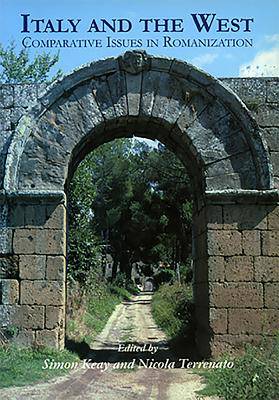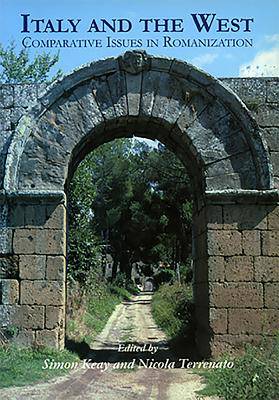
Je cadeautjes zeker op tijd in huis hebben voor de feestdagen? Kom langs in onze winkels en vind het perfecte geschenk!
- Afhalen na 1 uur in een winkel met voorraad
- Gratis thuislevering in België vanaf € 30
- Ruim aanbod met 7 miljoen producten
Je cadeautjes zeker op tijd in huis hebben voor de feestdagen? Kom langs in onze winkels en vind het perfecte geschenk!
- Afhalen na 1 uur in een winkel met voorraad
- Gratis thuislevering in België vanaf € 30
- Ruim aanbod met 7 miljoen producten
Zoeken
Italy and the West
Comparative Issues in Romanization
Simon Keay, Nicola Terrenato
Paperback | Engels
€ 60,45
+ 120 punten
Omschrijving
Nineteen papers examining varied responses to Romanization, and how this affects our view of the development of the Roman Empire. The traditional view of Romanization is as the triumph of a superior and more advanced culture over primitive communities, brought about by military expansion and resulting in the creation of a uniform political and cultural entity. It is only in the last twenty years that the variety of responses that Romanization elicited among the various ethnic groups, social classes, genders, spheres, and even within the same person in different conjunctures of his or her life, has begun to be appreciated. The aim of this collection of papers is to further understanding of Romanization at a formative stage; early Roman expansion in Italy. There is much evidence for bi-directional negotiation between Italian communities and Rome. Understanding the motivation of the Italian peoples to become part of a new political entity is crucial to knowing how Roman Italy was kept together for more than half a millennium. Seven papers also examine responses to Romanization in other parts of the Empire.
Specificaties
Betrokkenen
- Auteur(s):
- Uitgeverij:
Inhoud
- Aantal bladzijden:
- 233
- Taal:
- Engels
Eigenschappen
- Productcode (EAN):
- 9781842170427
- Verschijningsdatum:
- 31/07/2009
- Uitvoering:
- Paperback
- Formaat:
- Trade paperback (VS)
- Afmetingen:
- 172 mm x 243 mm
- Gewicht:
- 526 g

Alleen bij Standaard Boekhandel
+ 120 punten op je klantenkaart van Standaard Boekhandel
Beoordelingen
We publiceren alleen reviews die voldoen aan de voorwaarden voor reviews. Bekijk onze voorwaarden voor reviews.









